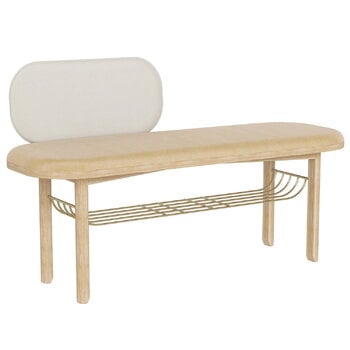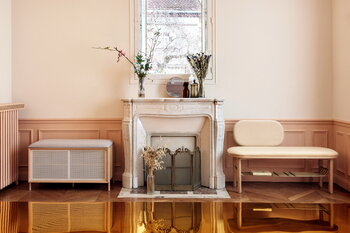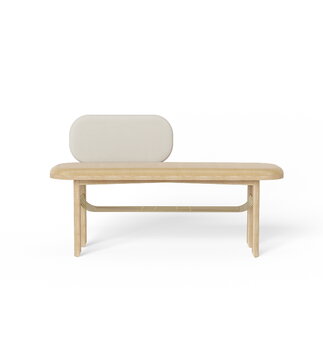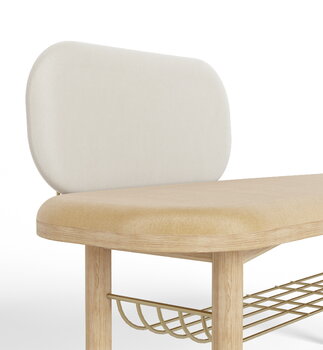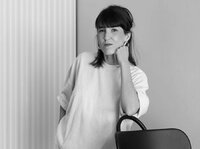Eustache is an elegant upholstered bench designed by Margaux Keller for Hartô. Filled with surprising details like the backrest placed only on one side and the brass basket underneath the seat for extra storage, Eustache is the perfect seat for your entrance, hallway or or dressing room. As a finishing touch, the bench’s feet have been cut diagonally to create a subtle reference to a ballerina’s pointed toes.
Eustache bench, oak - camel - beige
Hartô
Description
Eustache is an elegant upholstered bench designed by Margaux Keller for Hartô. Filled with surprising details like the backrest placed only on one side and the brass basket underneath the seat for extra storage, Eustache is the perfect seat for your entrance, hallway or or dressing room. As a finishing touch, the bench’s feet have been cut diagonally to create a subtle reference to a ballerina’s pointed toes.
Product details (10)
- Colour
- Oak, beige, camel
- Width
- 120 cm
- Height
- 74 cm
- Seat depth
- 40 cm
- Seat height
- 47.5 cm
- Leg height
- 40 cm
- Measurement details
- Length of the back 56.7 cm
- Frame material
- Oak, brass
- Seat cushion
- Foam padding
- Upholstery fabric
- Polyester velvet fabric
- Product ID
Designer
Margaux Keller is a French designer and interior architect. Having born in Geneva in 1987, Keller founded her own design studio in 2012 after studying design and interior architecture in Paris, France. Keller’s style is often described as feminine and delicate, and she believes good design is not only aesthetically pleasing and functional but also evokes feelings and memories. Keller likes to work in close collaboration with glassblowers, carpenters and other craftsmen to create unexpected designs with a touch of playfulness.
View all productsReviews (0)
Sustainability
The Product Sustainability Framework, our criteria of sustainable design, helps you find the most sustainable products in our selection. Read below which sustainability criteria this product has met.
Working conditions & labour 9/9
-
Equal opportunities for all employees
-
Commitment to UN Global Compact, fair compensation for all employees
-
Corporate responsibility requirements defined and communicated for suppliers
-
Systematic work for improved inclusion and well-being in the workplace
-
Transparent supply chain
-
Suppliers' compliance to a code of conduct ensured
-
Direct suppliers audited and certified
-
Compliance to the UN Guiding Principles on Business and Human Rights ensured in the supply chain
-
Support for community involvement in the supply chain
Eco-friendly production 7/9
-
Fair and resource-wise water-use in production
-
No incineration or landfilling of returned items
-
No use of endangered species as materials
-
No direct environmental emissions or waste (excl. GHGs) from production
-
The sustainability of direct suppliers' production is addressed and monitored
-
Material-efficient and ecological packaging
-
No potentially harmful chemicals used in own production
-
Production and material sourcing that respect biodiversity, animal rights, and natural ecosystems
-
Positive impact on nature’s well-being through operations that regenerate natural ecosystems
Climate impact 4/8
-
Company's direct greenhouse gas emissions identified and commitment to reduction
-
Product's carbon impact identified and commitment to reduction
-
Guidance on energy- and eco-efficient use of the product
-
Contribution to climate initiatives beyond the brand’s direct operations
-
Low-carbon or compensated transportation
-
Carbon footprint of the product calculated and goals set to reduce it
-
100 % renewable energy in own production and operations
-
Carbon neutral or carbon negative product
Sustainable materials 3/6
-
Sustainable and long-lasting material choices
-
No harmful or hazardous substances
-
Responsible raw material sourcing and production
-
Materials suited for circularity: monomaterials, recyclable finishings, renewable or recycled contents etc.
-
Ecological materials: natural, biodegradable, recyclable or recycled contents
-
Outstanding materials in terms of innovativeness, responsibility, sustainability and circularity: local production or sourcing, 100 % recycled content, C2C-certification etc.
Circular design 4/5
-
High aesthetic quality promoting long-term use of the product
-
Technically durable product design and material choices
-
Design for enduring life-long quality
-
Design and support for product maintenance, repair and upgradability
-
Innovative circular design solutions: circular service system, resale platform, remanufacturing, collection of used products, etc.
